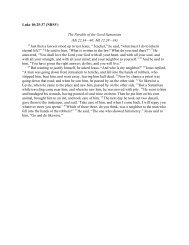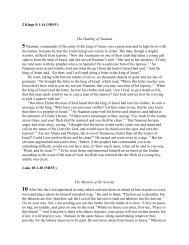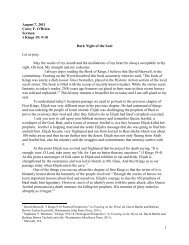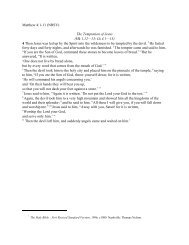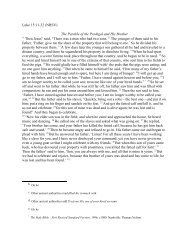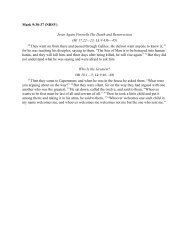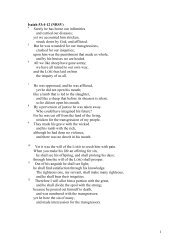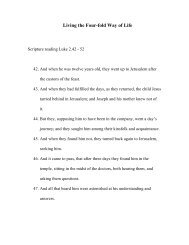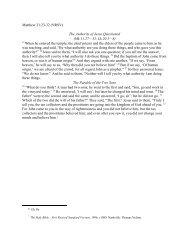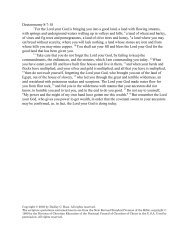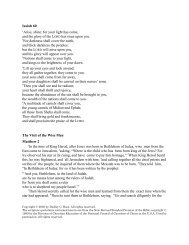Luke 16:1-13 (NRSV) - North Prospect Union UCC
Luke 16:1-13 (NRSV) - North Prospect Union UCC
Luke 16:1-13 (NRSV) - North Prospect Union UCC
Create successful ePaper yourself
Turn your PDF publications into a flip-book with our unique Google optimized e-Paper software.
<strong>Luke</strong> <strong>16</strong>:1-<strong>13</strong> (<strong>NRSV</strong>)<br />
The Parable of the Dishonest Manager<br />
<strong>16</strong> Then Jesus said to the disciples, “There was a rich man who had a manager, and charges<br />
were brought to him that this man was squandering his property. 2 So he summoned him and said<br />
to him, ‘What is this that I hear about you Give me an accounting of your management, because<br />
you cannot be my manager any longer.’ 3 Then the manager said to himself, ‘What will I do, now<br />
that my master is taking the position away from me I am not strong enough to dig, and I am<br />
ashamed to beg. 4 I have decided what to do so that, when I am dismissed as manager, people<br />
may welcome me into their homes.’ 5 So, summoning his master’s debtors one by one, he asked<br />
the first, ‘How much do you owe my master’ 6 He answered, ‘A hundred jugs of olive oil.’ He<br />
said to him, ‘Take your bill, sit down quickly, and make it fifty.’ 7 Then he asked another, ‘And<br />
how much do you owe’ He replied, ‘A hundred containers of wheat.’ He said to him, ‘Take<br />
your bill and make it eighty.’ 8 And his master commended the dishonest manager because he<br />
had acted shrewdly; for the children of this age are more shrewd in dealing with their own<br />
generation than are the children of light. 9 And I tell you, make friends for yourselves by means<br />
of dishonest wealth so that when it is gone, they may welcome you into the eternal homes.<br />
10<br />
“Whoever is faithful in a very little is faithful also in much; and whoever is dishonest in a<br />
very little is dishonest also in much. 11 If then you have not been faithful with the dishonest<br />
wealth, who will entrust to you the true riches 12 And if you have not been faithful with what<br />
belongs to another, who will give you what is your own <strong>13</strong> No slave can serve two masters; for a<br />
slave will either hate the one and love the other, or be devoted to the one and despise the other.<br />
You cannot serve God and wealth.”
It’s All Topsy Turvy<br />
A sermon preached at <strong>North</strong> <strong>Prospect</strong> <strong>Union</strong> United Church of Christ, Medford, Massachusetts<br />
Date: September 23, 2007<br />
Rev. Dudley C. Rose<br />
Text: <strong>Luke</strong> <strong>16</strong>:1-<strong>13</strong><br />
Jesus spoke to them in parables. He told them stories; the stories were analogies. The<br />
kingdom of God may seem small and unimpressive, but like the mustard seed, when it<br />
germinates and grows, it becomes a bush a hundred thousand times more impressive than the<br />
tiny seed it grew from. Or the sower broadcasts seeds. Some fall on the rocks, some on the path,<br />
some among the briers, and some on good and fertile ground. The analogy is pretty obvious.<br />
The word of God, the Gospel, is broadcast, just like the seeds. In some it finds rocky or hardpacked<br />
impenetrable ground. In some it sprouts, but the temptations of life drown it out or burn<br />
it up. But in some the Gospel finds fertile soil and flourishes and grows into great abundance.<br />
These parables are great stories. They make quite simple messages come alive. Most of<br />
us, I think, are drawn in by stories much more than we are by statements of fact. If I tell you that<br />
a real neighbor is someone, no matter what side of the tracks they are from, who shows<br />
compassion, and if I remind you that very often the most upstanding citizens show the least care<br />
for others, you may nod your head in agreement. But if I tell you the story of the Good<br />
Samaritan, suddenly you are engaged at a deeper level. You have more sympathy for the man in<br />
the ditch. You react with disgust at the priest and Levite who walked to the other side of the<br />
road to avoid the injured man in the ditch. You are amazed at the time and generosity the<br />
Samaritan showed the injured man, even as he was the least likely person to be of help of the<br />
three who came along the road that day.<br />
The parables of Jesus. They give us analogies to live by and to understand God by, and<br />
they bring them to life for us.<br />
So here we go this morning. We have a manager. He runs the affairs of business for the<br />
owner of the company. All seems to be going well enough. But underneath, out of sight, it’s not<br />
so wonderful. The manager is an embezzler. And someone blew the whistle on the embezzling<br />
manager.<br />
The owner of the company calls in the manager. He says, in the words of Donald Trump,<br />
“You’re fired.”<br />
The manager is in a fix. He thinks to himself, I’m a white-collar worker. I don’t do<br />
manual labor. Besides, I cannot support the standard of living to which I am accustomed by<br />
actually working for a living. I’m going to have do something fast.<br />
The manager hits upon a plan. He still has a few days before he leaves his job. We don’t<br />
know why that is, but he does. So the manager fires up the company’s copy of QuickBooks. A<br />
few clicks of the mouse, a few keystrokes on the keyboard and he’s got the listing of accounts<br />
receivable. He picks up the phone and begins to call. “Hi Mr. Jones, this is Oikonomous over at<br />
the plant. I see by our books that you owe us $550. Well I’m going to help you out today. I’m<br />
sitting right here at the computer, and I’m going to change that debt to $275, a 50% discount.”<br />
Mr. Jones is of course dubious. But Oikonomous assures him that there are no strings attached.<br />
1
Just doing it out of the goodness of his heart. And so it goes with calls to everyone on the<br />
accounts receivable list.<br />
The manager was a more devious than he let on, though. He had embezzled some of the<br />
owner’s profits, now he was giving more of the profits away to the company’s customers. In<br />
fact, unless the mark-up was extraordinarily high, he was letting the customers pay less than cost<br />
for the company’s products. He was devious with the customers, too, it turns out. He assured<br />
them there were no strings attached to the 50% discount. But in truth, Oikonomous was putting<br />
them in his debt. He was getting fired. He would soon be on the street. But he would have all<br />
these creditors who would be obligated to take him in.<br />
Of course, the owner caught on pretty quick. But the manager figured, what the heck,<br />
I’m fired anyway. What more can he do But here the story deviates. The owner comes to the<br />
manager and says, “Wow! You are really shrewd. That’s fantastic. I shouldn’t have fired you<br />
in the first place.”<br />
Okay, we’ve got a story. But what about the analogy If we assume that the owner is<br />
God and that we are managers of what God has given us to care for, which I think is inescapable,<br />
we’ve got a big problem. The owner does his Donald Trump routine and brusquely fires the<br />
dishonest manager. The tone of the Greek text supports reading the owner’s actions as Trumplike<br />
brusqueness, even violence. Then the manager makes a sneaky move to save himself. On<br />
the way out the door he ingratiates himself to the company’s customers, so he’ll have a place to<br />
go as he leaves. The manager looks out for himself, again dishonestly. But then the owner<br />
discovers the manager’s second malfeasance. This time the manager – remember the owner is<br />
God – God, says, “Man, you’re the man. You’re worse than I thought. You’re so bad I’m taking<br />
you back. I need people like you.”<br />
We’re in a predicament, aren’t we This God doesn’t make much sense. Praising the<br />
doubly dishonest manager doesn’t make much sense. How are we supposed to understand the<br />
analogy that Jesus is presenting in this parable<br />
Well, that’s the question, isn’t it And it’s been the question that perplexes the best<br />
Biblical scholars right up to today. Many accept the analogy at face value. They think that Jesus<br />
is trying to put a little realism, a little pragmatism, into the Gospel. They think that Jesus means<br />
that if you act naively, you will get run over in this world. If you’re not dishonest, you’re just<br />
not going to make it. God takes care of those who take care of themselves, they might say.<br />
I have to tell you something. If that’s what Jesus is trying to say, if Jesus is saying,<br />
“Look, you’ve got play the game,” if Jesus is saying, “All this religious stuff is fine, but in the<br />
end you’ve got to be shrewd and dishonest,” if that’s what Jesus is saying, if that’s what I ever<br />
come to believe that that is what Jesus is saying, that is the day that I will take off these robes,<br />
turn in my ordination and never preach again. In this world we live in, and throughout its<br />
history, it would be hard to find a mistake with graver consequences than when people have<br />
claimed that their most egregious wrongdoings are allowed by or encouraged by their religion. It<br />
seems to me painfully clear that almost every religion, including Christianity, goes to great<br />
lengths to undermine the evil we too easily rationalize, to undermine it, not promote it. It is<br />
inconceivable to me that Jesus himself would indulge in such rationalization.<br />
I recognize, however, that I cannot simply stamp my feet and say I don’t believe this<br />
parable. If I am to be more honest than the dishonest manager in the story, I need to suggest a<br />
different way of reading the parable. So, let’s go.<br />
2
First, we probably need to understand the context in which Jesus told the story a little bit<br />
better. The culture in Biblical times in the ancient near east was very different from our own.<br />
Here in the United States we live in a democracy in which we claim to all be created equal. It<br />
may be imperfect, but there is an overriding belief, that most of us are fortunate to live with, that<br />
we have inalienable rights to freedom and the pursuit of happiness, to fairness in business and in<br />
our interactions with one another. The ancient near east was much different. There were a very<br />
few rich people, and they had all the rights. The others were poor. They were under the thumb<br />
of the rich. They had no guaranteed rights. The ancient prophets and the religion of Israel was a<br />
voice for the widow and the orphan, the poor and the stranger, but they were a voice against the<br />
tide of the society. It’s one of the reasons that Jesus got into so much trouble. It was the poor<br />
and the powerless who flocked to him in the desert. He was hanging out with the people on the<br />
wrong side of the tracks. Not only that, he was talking to them as though they were people. This<br />
was troubling to the rich and powerful, who wanted these people to remain fearful and<br />
uncultured subjects.<br />
So, now imagine Jesus in the desert with his disciples and other followers, almost all of<br />
whom were from this low and oppressed class. When he begins the story of the dishonest<br />
manager, the people he was talking to immediately identified with the manager, not with the<br />
owner. While we are affronted by the manager’s dishonesty, Jesus’ hearers were cheering for<br />
him. Their hearts sagged when he got caught. But they cheered when the manager came up with<br />
his ingenious plan to save himself. And they would have agreed with the idea that if people in<br />
their situation in life were to succeed, they would need to be as shrewd as that manager was. But<br />
they also were aware of the huge risks. For in the world in which they lived, they could expect<br />
no mercy from the rich and powerful. At the drop of a hat they could expect the severest<br />
punishment.<br />
So here comes Jesus, an enigma unlike any they had ever seen before. In the world they<br />
live in, and in this sense their world isn’t so different from ours, in the world they live in, you’ve<br />
got to line yourself up with one side or another. Jesus, it seems abundantly clear, sides with the<br />
poor and the dispossessed. He socializes with them. He considers them human beings. They<br />
are the ones who flock to him. You don’t see Jesus in the halls of power until he is arrested, and<br />
then he’s there as a criminal. There seems to be no question on which side Jesus falls.<br />
But all of a sudden those who are following him, those who see him as an ally, those who<br />
hear him speak, all of a sudden they are caught off-guard. Often his stories don’t add up. For<br />
example, in this story of the dishonest manager, Jesus’ hearers would have expected one of two<br />
endings. The owner might have punished the manager even more severely for his second<br />
offense, and in that case Jesus’ hearers would have shaken their heads and said to themselves,<br />
“Well, that’s how it always ends up. We’re under the thumbs of the rich, and they always get<br />
us.” The other way they might have thought the story would end was that the manager got away<br />
with his second offense, and in that case they would have cheered the rare time when their side<br />
actually won.<br />
Jesus gives them neither ending. Jesus is unwilling to see the world the way his hearers<br />
do or the way they want him too. He’s unwilling to completely choose sides and then allow the<br />
side he’s chosen to do anything it wants. Most of all, Jesus is unwilling to let the societal<br />
divisions of the ancient near east, or of anywhere else, be the playing field on which God<br />
operates. Paul Neuchterlein remarks that Jesus tells a story that refuses to go by the script. In<br />
3
doing so Jesus intends to turn things topsy turvy. He wants to shatter the old alliances and<br />
challenge the bankrupt, knee-jerk self- justifications and self-deceptions. According to the script<br />
you get a story about a rich man acting harshly and a peasant deliciously trying to deceive his<br />
owner. As Neuchterlein says it, “The story's last move leaves the hearer with the fact that their<br />
hero, the servant, has acted unjustly, and their bad guy has shown mercy.” 1 Bernard Brandon<br />
Scott says it even more provocatively in his book, Hear Then the Parable. Scotts says, “The<br />
hearer now has no way to navigate in the world; its solid moorings have been lost. Are masters<br />
cruel or not Are victims right in striking back” 2<br />
Jesus is looking to break the old molds. In the old mold the powerful are unjust and the<br />
weak are just. In the old mold, the powerful always have power, but never have justice. In the<br />
old mold, the poor never have power, and almost no matter what they do, they are said to be<br />
fighting for justice. The old mold is a mold where getting even is the name of the game. The<br />
powerful get even by, well, exercising their power, by punishment. The weak get even by<br />
deviousness.<br />
Jesus wants us to imagine a world which is like unto the kingdom of God, world in which<br />
the old mold is shattered. Scott says that the parable breaks the old equations related to power<br />
and justice and getting even. “The kingdom is for the vulnerable, for masters and stewards who<br />
do not get even, he says.” 3<br />
Jesus pulls the rug out entirely out from under all who hear him. The vulnerable are<br />
accountable, despite their lack of power. The manager’s actions are not vindicated in the<br />
parable. On the other hand, the powerful are to act with mercy, even toward those who, like the<br />
manager, have acted wrongly. Jesus gives us ending that challenges the old calculus. He joins<br />
accountability and mercy where we fail. He shatters the old ideas of punishment and retribution<br />
and getting even.<br />
So, I will keep my robe and ordination and go on to preach another day, for in this<br />
parable I see a Jesus who neither allows us to rationalize away our wrong, but who also shows a<br />
God who meets us with mercy and forgiveness rather than merciless punishment, in the face of<br />
our malfeasances. Jesus has turned things topsy turvy, and for that I can only say, thanks be to<br />
God. Amen.<br />
1 http://girardianlectionary.net/year_c/proper20c.htm<br />
2<br />
Quoted in: http://girardianlectionary.net/year_c/proper20c.htm<br />
3 Ibid<br />
Copyright © 2007 by Dudley C. Rose. All rights reserved.<br />
4



